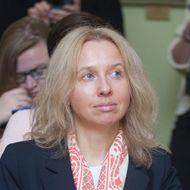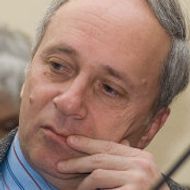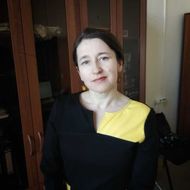- A
- A
- A
- ABC
- ABC
- ABC
- А
- А
- А
- А
- А
- HSE University
- Faculties
- Faculty of Humanities
- School of History
- News
- Internship at the Holocaust Museum in Washington
105066 Moscow, Staraya Basmannaya 21/4, building 3
Phone: +7 (495) 772 95 90 *22858
The HSE School of History was established in 2015 on the basis of the HSE faculty of history. The School's staff brings together leading scientists in various fields of historical knowledge who are widely known and respected in Russia and the international academic community. The School’s instructors are leading historians are authors of numerous books and articles, regular participants in major international scientific forums and research projects, and are also known as popularizers of historical knowledge. The HSE School of History actively cooperates with leading foreign universities and research centers, and organizes international scientific conferences, symposia, and colloquiums.
Strasbourg: Presses universitaires de Strasbourg, 2023.
Misiak M., Butovskaya M., Sorokowski P.
Food Quality and Preference. 2024. Vol. 114.
In bk.: Picturing Russian Empire. Oxford: Oxford University Press, 2024. Ch. 6. P. 66-73.
Kolesnik A., Rusanov A.
Working Papers of Humanities. WP. Издательский дом НИУ ВШЭ, 2021. No. 205.

Internship at the Holocaust Museum in Washington
Elena Krivtsova
We spent our six-week internship at the Jack, Joseph and Morton Mandel Center for Advanced Holocaust Studies. Daniel Newman, Program Manager of the Initiative for the Study of the Holocaust in the Soviet Union, was our instructor and helped with questions that arose and with accomplishing new ideas. The museum where we worked narrates the story of a horrible tragedy, and its exhibition leaves you with a hard feeling of the unfairness of war. One of the museum’s slogans is ‘Think About What You Saw’. The exhibition makes you think about many things, such as human nature, the reasons why humans are so cruel to one another, how it became possible and what is going on in the world today.
Over many years, the United States Holocaust Memorial Museum has actively supported researchers from various countries in their study of World War II, the Holocaust and other forms of genocide. The Holocaust Museum, which opened for visitors in 1993, established close ties with the Russian State Archive in the 1990s. At that time a museum team went to Moscow to copy documents related to mass exterminations of Jews on the territory of the Soviet Union. My task was to compile a topical annotated catalogue of such documents. The archivists and librarians helped us a lot. In addition, my work was greatly facilitated by the library’s modern equipment. The main challenge was working with the frightening feeling that many of the documents were written by people who experienced those horrible events firsthand.
The knowledge and skills I had acquired before the trip when I worked as a research assistant at the HSE International Centre for the History and Sociology of World War II and Its Consequences helped me greatly in using the opportunities offered by the Center for Advanced Holocaust Studies. I am grateful to the Centre’s staff for this – above all to my academic supervisor Oleg Budnitsky.
One of my strongest impressions from this trip is how open people there are to everything new and unusual, as well as how libraries and archives are open for everyone who wants conduct research.
Alexandra Maslova
The museum staff welcomed us very warmly. Despite the fact that we were the youngest interns, the age difference didn’t bother anyone. Everyone helped us and gave advice not only on research, but in terms of everyday life. At first I was afraid that I would have difficulties with the language, but it turned out I had virtually no problems. The internship helped me to improve my English.
The museum exhibitions occupy four floors. All the exhibitions are very expressive and realistic, which helps show the visitors a real picture of horror and tragedy that happened during WWII. This is why I walked through all four floors with a sinking heart; they really transformed my views of Nazi crimes and the Holocaust.
The work at the museum was incredibly interesting and productive. We were given a work plan that was aligned with our research interests. My task was to look through the archives and collect information on Soviet children who were relocated during WWII. All of the archive materials are in digital form.
I want to specially thank Daniel Newman, who helped me and gave advice during the entire internship; Martin Dean, who helped me find information on ostarbeiters in ITS (International Tracing Service) and referred to many publications on this topic; Betsy Anthony for the brilliant seminar that helped me to understand ITS and meet many remarkable people; Susan Brown and Krista Hegburg who were ready to help in any situation; and Elana Jakel who also helped us when we had questions. And of course, many thanks to Paul Shapiro, Director of the Mandel Center, for the opportunity to spend the internship at the museum.
I can say for sure that this summer was the best one in my life. Many thanks to our academic supervisor Oleg Budnitsky, who not only gave us valuable advice before the trip, but supported us when we were overseas. We are also very grateful to our faculty and the university for giving us the opportunity to complete the internship and for providing some financial support.
- About
- About
- Key Figures & Facts
- Faculties & Departments
- International Partnerships
- Faculty & Staff
- HSE Buildings
- Public Enquiries
- Studies
- Admissions
- Programme Catalogue
- Undergraduate
- Graduate
- Exchange Programmes
- Summer University
- Summer Schools
- Semester in Moscow
- Business Internship
-
https://elearning.hse.ru/en/mooc/
Massive Open Online Courses
-
https://www.hse.ru/en/visual/
HSE Site for the Visually Impaired
-
http://5top100.com/
Russian Academic Excellence Project 5-100
- © HSE University 1993–2024 Contacts Copyright Privacy Policy Site Map
- Edit



